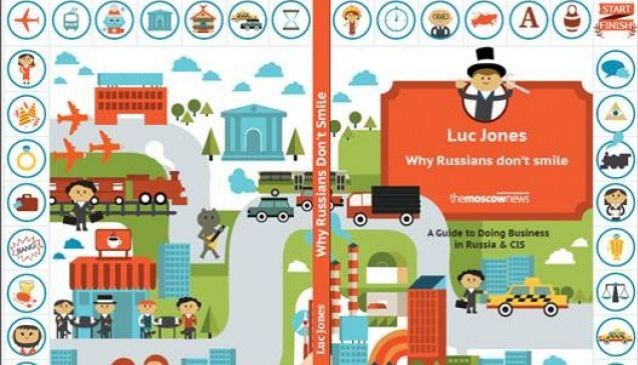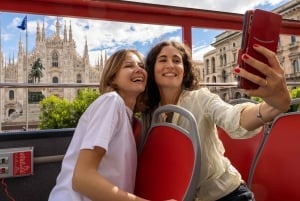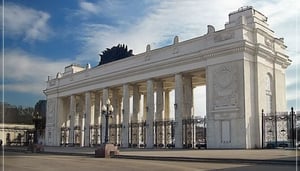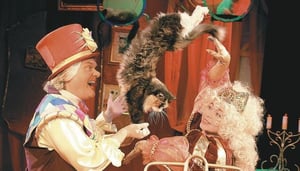Why Russians Don't Smile
New book of Luc Jones
Book Top Experiences and Tours in Moscow:
If youʻre booking your trip to Moscow last minute, we have you covered. Below are some of the top tours and experiences! View All ExperiencesBritish-born Luc Jones first came to Russia in the early '90s to study. He later worked in Moscow, then Poland before returning to Moscow in 2002 to work with Antal Russia where he is now a partner. He has traveled to over 100 countries, including all 15 former Soviet republics. Jones has used this considerable experience to put together his recently released guidebook to doing business in Russia. talks with Jones about traveling in Russia and what the first-time visitor needs to know.

Your new book titled “Why Russian's Don't Smile” was recently released. Such a provocative title of course begs the question: “Why don't they smile?”
Why don’t Russians smile? Well, they do, just not as often as we do! I simply chose this title as it’s one of the main stereotypes that foreigners have about Russians. People in Russia smile if they have a positive reason to do so, whereas in the West we smile to put other people at ease. The general rule of thumb is that if someone doesn’t smile at you, if doesn’t mean that they don’t like you, they just don’t know you, but if you do see a smile, then chances are that you have made a positive impression on them!
As a guide to doing business in Russia, the book provides a wealth of insights for the first-time expat coming to work in Russia. What's more, however, it also offers useful information for tourists and visitors coming to Moscow as well. If you had to choose any one piece of advice from your book for the first-time traveler to Moscow, what would it be?
If you are coming to Moscow for the first time, regardless of whether it’s on business or just to visit, ignore whatever you’ve read in the Western media, such as crap about the Russian mafia. Do familiarize yourself with the Cyrillic alphabet (even if it’s just on the plane on the way here) since very little signage is in English.

What are the worst and most out-of-date stereotypes do to with traveling and living in Russia?
Probably the most out-of-date stereotype is that Russia is dangerous. Sure, Moscow is a big city with its fair share of petty crime, but on the whole I believe that it is far safer than London, Paris or New York…
Are there any cultural differences that you think a visitor should be aware of?
Culturally, be aware that both Russia and Russians have a rather gruff exterior, but once you get to know them, Russians are extremely hospitable. The West is nicely boxed up, and you (almost) always know where you are and what to expect. In Russia, expect the unexpected!! Additionally, Russians tend to be much more emotional than Westerners, even if this isn’t obvious from the outset – they can make spontaneous decisions that to foreigners can appear extremely irrational, based on emotion, not logic. Our decision-making process tends to be much more pragmatic, which strikes Russians as a bit boring!
What's the first place you take out-of-town guests? Is there a destination you show them that you won't find in the guide books?
I tend to take first timers around the usual sights (Kremlin, Red Square and the Arbat), but also to Kolomenskoye – nothing out of the ordinary, and in the evenings I’m fond of the Chaikhona-style Uzbek restaurants, which never fail to disappoint. Unfortunately guidebooks to Russia focus mainly on Moscow and , and not much else – last year I visited cities such as Orenburg and Cheboksary, neither of which were even mentioned in the Lonely Planet…

What advice do you have for those who have come for a visit and decide that they would like to stay and work? How should they go about finding a job?
Moscow is not really the type of place that attracts backpackers who’ve landed here and fancy staying on – for starters visas are tricky to obtain and are very expensive, and the high cost of living in Moscow is a subject in itself. This is a city for the hardcore only – you really need to want to be here, and be both dedicated and determined in what you want to get out of your stay. This isn’t a city for the faint hearted where you can just show up and see how it goes (unless you have deep pockets) – as the Soviet film title sums up, ‘Moscow doesn’t believe in tears’!!
In terms of work, the market has localized considerably since the 1990s, and being an expat is no longer a profession in itself – you need to ask yourself one simple question: “what can I do that a qualified, experienced Russian can’t” – and the answer in most cases is not much – especially if you don’t speak Russian.
There are of course exceptions, with people having done extremely well, having started out with next to nothing, but don’t assume that it will be an easy ride!
Teaching English is the one obvious starter – I did it back in 1995-6 after graduating from university – it’s well paid, there is high demand for native speakers and (in many cases) you probably don’t need any formal qualifications.
To get a free PDF copy of Luc's book "Why Russians don't smile" please click here










